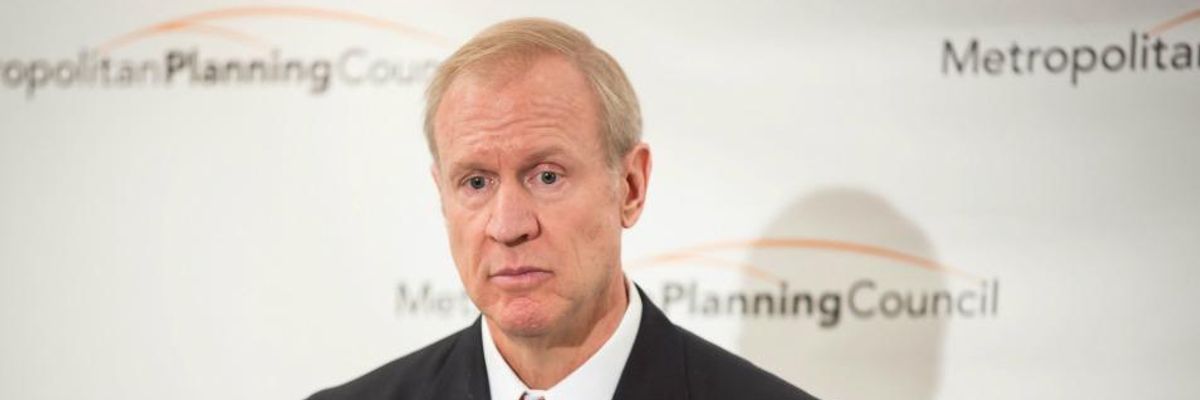With its deep cuts to higher education, Medicaid, pension benefits, and social services, Illinois Governor Bruce Rauner's proposed budget is being called "reckless," "heartless," and "morally reprehensible."
Rauner, who won a decisive victory over incumbent Gov. Pat Quinn in November, announced his budget plan before the Illinois General Assembly earlier this week. It lays out $6 billion in cuts in state spending on universities, health care, and local governments while calling for sharply reducing pension benefits for state workers--in keeping with Rauner's recent attacks on public sector unions.
"Governor Rauner's plan includes proposals that will undermine access to health services, child care, affordable college and retirement security for working- and middle-class families."
--John Cullerton, Illinois State Senate
The governor called it a "turnaround budget" for a state facing budget shortfalls in the years ahead.
But Democrats, who hold veto-proof majorities in both chambers of the legislature, came out strongly in opposition to Rauner's proposal. State Senate President John Cullerton, for example, said the plan would bring "pain" to working families in the state.
"Governor Rauner's plan includes proposals that will undermine access to health services, child care, affordable college and retirement security for working- and middle-class families," Cullerton said. "These programs provide many of the work supports and opportunities that families need to succeed and respond to the economy."
The Responsible Budget Coalition, which represents over 100 groups in Illinois, said the "unnecessary" cuts would have "lasting negative impact on our infrastructure and undermine our state's ability to achieve long term economic stability."
"The depth and breadth of the proposed cuts to essential services for our state's most vulnerable residents are staggering and simply unacceptable," said Heather O'Donnell, vice president of public policy and advocacy at Thresholds, a member of the Responsible Budget Coalition that provides housing and healthcare for thousands of people with mental illness in the state.
With such concerns in mind, a group of day care providers, health care workers, and activists gathered outside Chicago's Thompson Center, which houses the Illinois state government, on Thursday evening to protest the cuts.
"I think people see numbers and they don't think about people and they think we'll just cut that and they don't think about human consequences," a writer named Mike Ervin, who is assisted every day by a state-paid home care assistant, told Chicago's ABC News affiliate at the demonstration.
Among the most egregious of Rauner's proposals is his call to slash public university spending by nearly $400 million--representing a 31 percent decrease in funding.
Illinois State University President Larry Dietz was just one of several higher ed leaders who blasted the proposed cuts. "Cuts of this magnitude would have a devastating impact," Dietz wrote in a letter posted to the school's website on Wednesday.
"Rauner has spent much of his first few weeks on a right-wing, ideological binge, attempting to make his case slashing modest programs boosting injured and unemployed workers, dropping local wage and benefit standards, and attacking state workers and their unions."
--Michael Carrigan, Illinois AFL-CIO
According to the Chicago Tribune: "The new Republican governor's move follows a pattern of higher education funding reductions embraced by fellow GOP governors such as Wisconsin's Scott Walker and Louisiana's Bobby Jindal, a pair of Republicans who like to burnish their bonafides with their political bases."
Indeed, Rauner's approach is in keeping with the national right-wing playbook, said Michael Carrigan, president of the Illinois AFL-CIO.
In a statement, Carrigan accused Rauner of spending "much of his first few weeks on a right-wing, ideological binge, attempting to make his case slashing modest programs boosting injured and unemployed workers, dropping local wage and benefit standards, and attacking state workers and their unions.
"While this may be a political message he wants to send, it is not constructive in solving our state's financial woes," Carrigan added. "These proposals do little to improve our state finances, but will certainly undermine middle class economic security... Now is the time for real solutions, not political rhetoric."
Illinois Federation of Teachers president Dan Montgomery also denounced Rauner's approach. "Rather than address revenue in a responsible way, today Governor Rauner recommended decimating public services for middle class families in order to pay for massive tax breaks for the very wealthy," Montgomery argued.
In a piece for The Nation titled, "We Need Syriza in Illinois," labor and environmental organizer Jane McAlevey wrote of Rauner: "He spent $65.9 million--including $27.6 million of his own money--buying his last election, and he's about to introduce an austerity program that will make most folks in Illinois think they are living in austerity-wracked Greece, with less idyllic weather."
McAlevey continued:
While he's generating national headlines by trash talking unions, he is quietly taking a scalpel to every important social program in the state, starting with an Illinois program that subsidizes high-quality childcare for 160,000 low-income kids. Instead of extending a small tax increase that passed the Illinois legislature in 2011, staving off a crisis, he's letting the increases expire. Rauner is methodically manufacturing an economic crisis for his state, one that will let him do what he has long been set on doing: shrink the government and squeeze the 99 percent.

